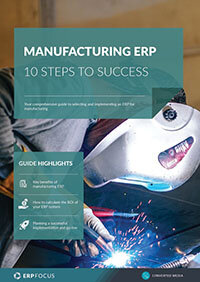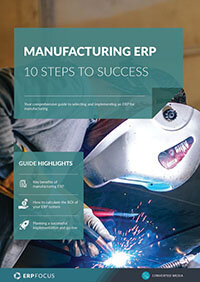4 challenges associated with mobile ERP for manufacturers
The efficient execution of ERP-managed manufacturing operations begin and end with the production line, where raw materials enter the process and end up as finished goods. It doesn’t matter if the product is digital chips or the latest line of sneakers, one way or the other, the goal of the line is always driven by the same considerations; ensure stable throughput end-to-end by maintaining standardized efficiencies at every production stage, then finish up by executing well-understood quality assurance processes that validate the work every time.
mobility has streamlined the management and delivery of resources while creating new operating complexities
Mobile ERP for manufacturers has largely changed this landscape since mobility has streamlined the management and delivery of resources while creating new operating complexities that must be dealt with in real-time. Although there is no sure way to trim an ERP system properly while accommodating mobility, there are some areas within the manufacturing process that sometimes harbor trouble.
1. Data standardization on mobile devices
Mobility generally means speed, in many processes in today’s manufacturing environment this means that ERP databases are working harder than ever before. That said, however, low-level record standardization, or rather the lack thereof, can cause all kind of havoc unless ERP operators ensure that all databases and subordinate elements are consistent throughout the process chain. To do so otherwise runs the risk of creating a fast moving failure cascade that can start with a single input error from a mobile device and quickly turn into a torrent of misaligned data or even log-jammed processes that can drive a production line to its knees in a heartbeat.
Recommended reading: Manufacturing ERP - 10 steps to success
2. Database synchronization errors
In the same way that non-standard data from mobile sources can cause an ERP system to falter, entire databases can cascade in the same way; and for the same reasons. Generally stable systems integrations utilizing legacy databases tend to harbor all kinds of synchronization errors that wouldn’t ordinarily rise to the surface in the case of non-mobile operations. However, if you add one or more data channels driven by mobility, synchronization processes have to be even more efficient and reliable. Any system which supports mobile ERP will immediately experience rapid increases in synchronization of data throughout the entire production chain which in turn, can lead to numerous ways to trigger a database failure, and as soon as one database goes south others are likely to follow.
3. Creating a robust networking infrastructure
The advantages of mobile ERP for manufacturing exists on the basis of stable, high-speed connectivity or bulletproof support for offline-online synchronization. So if an ERP system is dependant on mobility to operate most efficiently, then one also might expect that the connective backbone that supports that capability is also both dependable and robust enough to ‘take a licking and keep on ticking.’
4. A spotlight on existing processes
Manufacturing ERP system environments are intrinsically complex without adding unnecessary grist to the mill. Therefore, when considering the integration mobile ERP, manufacturers should ensure that all ERP modules and their subordinate processes should be as effective as possible, since as soon as one turns on the mobile data-spicket, the experience of drinking from a fire hose will become the norm rather than the exclusion.
Free white paper

Manufacturing ERP: 10 steps to success
Complete step-by-step guide to manufacturing ERP software

Related articles
-
![Mobile ERP case studies you can learn from [Image by javi indy on Freepik] Mobile ERP case studies you can learn from [Image by javi indy on Freepik]](/pictures/W1siZiIsIjIwMjQvMTAvMTYvejB2YnNremFyX01vYmlsZV9FUlBfY2FzZV9zdHVkaWVzX3lvdV9jYW5fbGVhcm5fZnJvbV9JbWFnZV9ieV9qYXZpX2luZHlfb25fRnJlZXBpa18uanBnIl0sWyJwIiwidGh1bWIiLCI0MDB4MjY2IyJdLFsicCIsImVuY29kZSIsImpwZyIsIi1xdWFsaXR5IDg1Il1d/Mobile%20ERP%20case%20studies%20you%20can%20learn%20from%20%5BImage%20by%20javi%20indy%20on%20Freepik%5D.jpg?sha=d39d01df11779155)
Mobile ERP case studies you can learn from
Learn how mobile ERP has benefited three businesses...
-

CMMC Compliance: What Aerospace and Defense Manufacturers Need to Know
Key insights on CMMC compliance, deadlines, and securing DoD contracts with CMMC 2.0 certificatio...
-

Are you ready for low-code ERP?
Exclusive guest blog from Rootstock talking about low-code ERP

